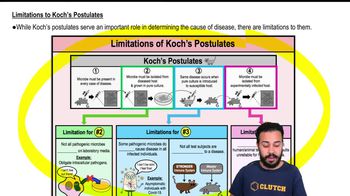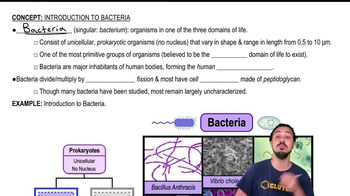Here are the essential concepts you must grasp in order to answer the question correctly.
Nutrient Limitation
Nutrient limitation occurs when essential nutrients, such as nitrogen and phosphorus, are in short supply, restricting the growth and reproduction of microorganisms. In the context of oil-degrading bacteria, these nutrients are critical for cellular processes, including protein synthesis and energy production. Without adequate nitrogen and phosphorus, the bacteria cannot effectively utilize the available carbon from the oil, leading to stunted growth.
Recommended video:
Limitations to Koch's Postulates
Oil-Degrading Bacteria
Oil-degrading bacteria are specialized microorganisms capable of breaking down hydrocarbons found in oil. These bacteria possess specific enzymes that allow them to metabolize complex oil compounds into simpler substances. Their growth and activity are heavily influenced by the availability of nutrients, which are necessary for their metabolic functions and overall survival in environments contaminated by oil.
Recommended video:
Eutrophication
Eutrophication is the process by which water bodies become enriched with nutrients, often leading to excessive growth of algae and bacteria. In the case of an oil spill, adding nitrogen and phosphorus can stimulate the growth of oil-degrading bacteria, promoting bioremediation. However, without these nutrients, the natural balance is disrupted, and the bacteria cannot thrive, resulting in slower degradation of the oil.



